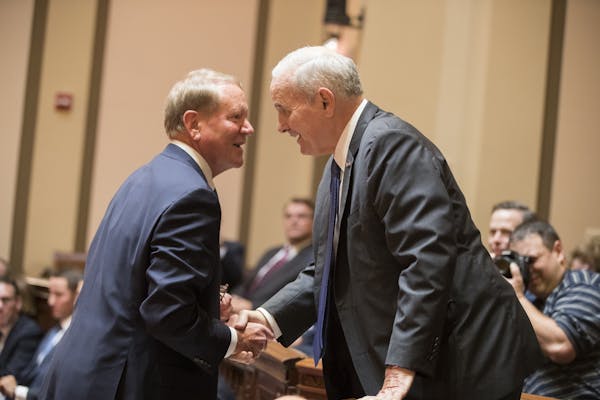The Minnesota Supreme Court said Friday that it was within Gov. Mark Dayton's authority to veto funding for the state Legislature, ordering the DFL governor and Republican legislative leaders to work with a mediator to finally resolve their long-simmering constitutional dispute.
Dayton and lawmakers "should resolve these doubts through the political process," Chief Justice Lorie Skjerven Gildea wrote in the six-page order. Failure to do so means "Minnesotans may soon be deprived of their constitutional right to three independent branches of government," she wrote.
The court was definitive on the propriety of Dayton's underlying action: Citing a section of the Minnesota Constitution, Gildea wrote that Dayton's "exercise of his line-item veto power over the appropriation for the Legislature's biennial budget was constitutional." But the order was less clear about the real-world consequences of Dayton's decision, and it threw the question of ongoing state funding for the Legislature back into limbo.
"Constitutional powers may not be used to accomplish an unconstitutional result," Gildea wrote.
Dayton and DFL allies praised the order, with Dayton pronouncing himself "pleased." Dayton has long argued that his veto was a legitimate political weapon wielded during a contentious budget debate, as the governor tried to pressure Republicans to reconsider a series of tax cuts and several policy changes that he said he only signed into law under pressure.
Republican leaders, meanwhile, argued that the order did not vindicate Dayton's action.
The justices did not reach a definitive conclusion about how to secure future funding for the Legislature. The legal wrangling prompted by Dayton's veto and the Legislature's subsequent lawsuit, the court found, continues to "raise doubts" about the legislative branch's ability to function.
The order states that the two sides must go through mediation first before they could return to the Supreme Court to make a case for why the justices should (or should not) order funding.
Dayton said he is open to mediation, noting that he had "proposed just such a remedy" when he issued his veto letter in May. It was Republicans who insisted on taking it to court, Dayton pointed out.
"I remain ready and very willing to engage in those negotiations immediately," Dayton said. "I have asked my legal team to contact their legislative counterparts to begin to resolve this matter."
House Speaker Kurt Daudt, R-Crown, and Senate Majority Leader Paul Gazelka, R-Nisswa, said in a joint statement that they were pleased the court "recognized Minnesotans' right to a functioning legislative branch of government" but did not believe the order amounted to a win for Dayton.
"Today's order did not decide the case or vacate the lower court's ruling, and we are ready to go to mediation to secure funding for the legislative branch of government," they said.
The GOP leaders said they did not dispute Dayton's right to issue the veto, but noted the Supreme Court's reference to an "unconstitutional result" stemming from that action.
The entire dispute dates to the final days of this year's legislative session, in May. As Dayton and GOP leaders negotiated the state's next two-year budget, Republicans seeking to get the governor to sign off on their tax-cut package that they knew he disliked linked funding for the state Department of Revenue to passage of the tax bill. In response, Dayton vetoed legislative funding, arguing that it was the only way to get Republicans back to the negotiating table.
The Legislature sued, arguing that Dayton violated the constitutional separation between equal branches of government. The two sides later agreed to a tentative deal that funds the House and Senate through Oct. 1.
Now the Legislature's financial status is again clouded by uncertainty. The court's order, signed by Gildea, directs Dayton and legislative leaders to hire a mediator by Sept. 12 and submit a report on the status of the Legislature's bank accounts by Sept. 15. Both sides are also expected to draft arguments about whether or not the court should be involved in determinations about how the House and Senate are funded.
Gildea's order did not include any dissents from the five justices who participated in the case. Justice David Stras recused himself from the case.
Erin Golden • 612-673-4790
